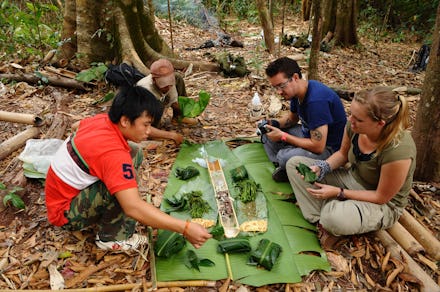Enabling Empathy Through Travel: A new travel series on 'Mic'

This is the first entry in a new series called "Enabling Empathy Through Travel."
"Travel is fatal to prejudice, bigotry and narrow-mindedness, and many of our people need it sorely on these accounts. Broad, wholesome, charitable views of men and things cannot be acquired by vegetating in one little corner of the earth all one's lifetime." — Mark Twain
The results of this recent election shocked, infuriated and depressed a huge swath of millennials around the world, especially in the United States. The progress we thought we'd made all of a sudden seemed hollow. A man who ran on ideals of racism, misogyny and xenophobia earned enough support to become the leader of the free world for at least four years. And while there are so many things to learn and take away from this event, what stands out the most is how little we know about people who think differently from us.
It's difficult to know people different from you if you've never experienced what they experience, let alone had an open and real conversation with them. This election season has shown us there are many rural Americans who are prejudiced against Muslims and Hispanics. Similarly, there are people from our coasts and big cities who believe every rural white American is a racist bigot. One likely commonality between both groups is that, for many reasons, neither has taken the time to truly understand the other's position in the world.
Through technology and a culture of rapid innovation, the world is becoming more and more connected. This is a scary concept for historically privileged populations. They associate that change with declining wages and a loss of cultural identity. Such associations make one vulnerable to believing false information about those outside of their communities, and embolden a will to further isolate themselves from what would otherwise be considered progress.
Meaningful travel is a powerful tool in combating this problem. To travel meaningfully is to make a concerted effort to actually get to know the place and the people you are visiting. I'm not talking about going to an all-inclusive resort and never venturing too far from the pool. I'm talking about traveling with the purpose of experiencing and understanding something new. We're fortunate to live in a time where it is easier than it has ever been to accomplish this. When you travel in a meaningful way, it is difficult to hold on to hatred and prejudice, and for that reason, we believe that everyone should do it.
Over the coming months, we at Keteka want to share stories and perspectives of people who have made and are making concerted efforts to experience and positively impact other parts of the world. Their stories will highlight the power that travel can have on individuals and communities, both abroad and at home. This series is about enabling empathy by highlighting the beauty of cultures that many Americans don't fully understand or appreciate, and traveling in order to change our own perspectives.
We begin with the second theme in an article by my business partner, who I met during my service as a Peace Corps volunteer in Panama, who explains how living on an indigenous reservation changed his perspective on voting; how a trip to Idaho helped him understand pickup trucks and guns; and how living with a black family (my family) for a month was a better educator than any book on race in America.
We will also hear from a lot of other young Americans, from diverse backgrounds, who have shaped, changed and then reshaped their worldview because of their travel experiences. We hope this series helps you better appreciate and understand our world, and we look forward to hearing your stories and thoughts on these themes at @Mic and @KetekaTravel.
About the author: Kyle Wiggins is the co-founder and CEO at Keteka, a marketplace where travelers can book unique, authentic tours and activities with validated local guides. He is passionate about and devoted to the intersection of entrepreneurship and international development. Kyle spends the majority of his time between Chicago and Santiago, Chile.